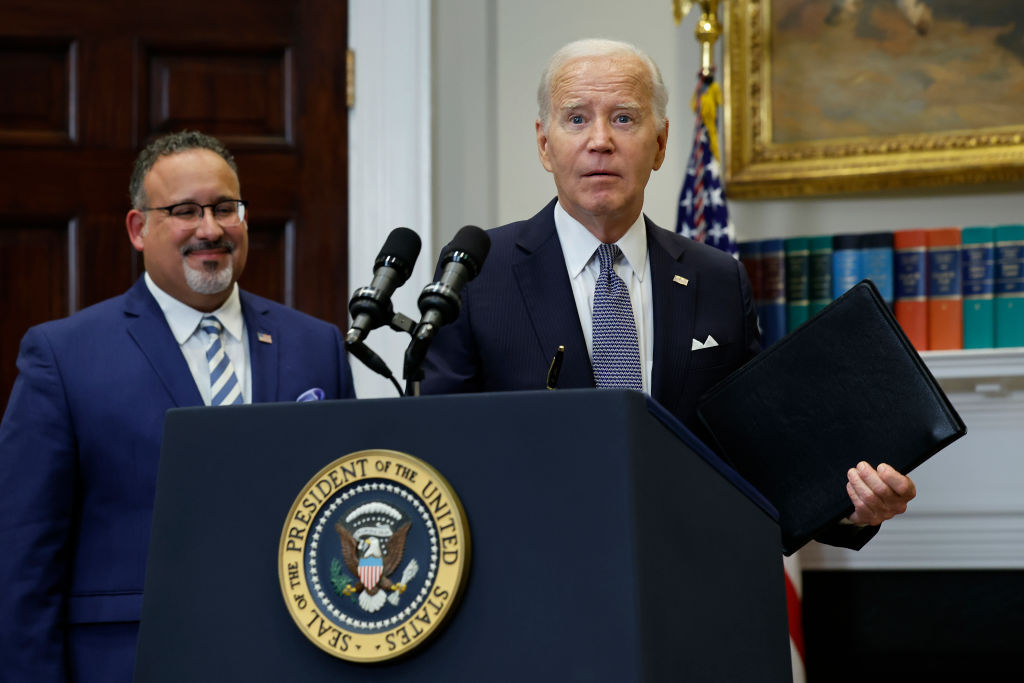Biden Takes Another Swing at Student Debt Cancellation
Happy Wednesday! We’re not sure what it says about society that it takes an ancient sign of the end times to get us off our phones.
Quick Hits: Today’s Top Stories
- President Joe Biden on Tuesday criticized Israel’s strike on World Central Kitchen vehicles earlier this month and called on the country to implement a six-to-eight-week humanitarian ceasefire in Gaza. “I think it’s outrageous that those four, three vehicles were hit by drones and taken out on a highway, where it was along the shore, it wasn’t like it was a convoy moving,” Biden said in an interview with Televisa-Univision. “What I’m calling for is for the Israelis to just call for a ceasefire, allow, for the next six [to] eight weeks, total access to all food and medicine going into the country.” Administration officials have since clarified that the remarks didn’t mark a change in U.S. policy toward the war, despite the president’s failure to mention the hostages still held by Hamas in Gaza. Meanwhile, ongoing ceasefire and hostage deal negotiations hit another roadblock after Hamas informed mediators that, in order to satisfy Israel’s request for the release of another 40 living hostages, it would have to free male Israeli troops—which the terror group is unwilling to do. Representatives for Hamas have reportedly told negotiators the group no longer has 40 living elderly or female hostages in its possession.
- The Arizona Supreme Court ruled on Tuesday that all abortions in the state will soon be banned, with the exception of those necessary to save the life of the mother. The 4-2 decision held the state’s 15-week limit, adopted in 2022, doesn’t supersede an 1864 abortion ban that had long been preempted by Roe v. Wade because the state “legislature has never affirmatively created a right to, or independently authorized, elective abortion.” Enforcement of the old ban isn’t set to begin for at least two weeks, and Arizona voters could effectively reverse the decision in a November vote on a ballot measure. Several prominent Republicans in the state—including likely Senate nominee Kari Lake and former Gov. Doug Ducey—distanced themselves from the court’s decision, with Lake saying in a statement that the “pre-statehood law is out of step with Arizonans” and that she will oppose any “federal ban(s) on abortion” if elected to the Senate.
- A New York state appeals court judge rejected another last-ditch attempt by former President Donald Trump to delay the start of his hush money criminal trial, set to begin Monday, while he challenges a gag order imposed on him by the judge overseeing the trial. The rejection came only one day after a different appeals court judge shot down a separate attempt to delay the trial related to hush money payments to porn star Stormy Daniels, which is set to begin on April 15.
- Rail company Norfolk Southern agreed on Tuesday to a $600 million settlement to resolve a class-action lawsuit related to the February 2023 train derailment in East Palestine, Ohio, that spilled and burned hazardous chemicals. The agreement settles class-action claims for residents and businesses within a 20-mile radius of the train crash and personal injury claims for residents within a 10-mile radius, providing payouts the plaintiffs can use “in any manner they see fit to address potential adverse impacts from the derailment.” The settlement still needs to be approved by a judge.
- GOP Rep. Marjorie Taylor Greene circulated a letter to her House colleagues on Tuesday doubling down on her threat to oust Republican House Speaker Mike Johnson. “I will not tolerate this type of Republican ‘leadership,’” she wrote, citing his stewardship of the government funding bill passed before the Easter recess. In March, Greene filed—without requiring an immediate vote on the question—a resolution that could trigger procedures to remove Johnson. She described the motion last month as a warning, and didn’t indicate a timeline in her letter yesterday for bringing it to the floor.
- New York Attorney General Letitia James announced on Tuesday that Jacob Wohl and Jack Burkman—two far-right operatives—agreed to pay a $1.25 million settlement over a voter suppression robocall scheme targeting black voters that the two orchestrated in 2020. Last March, a federal judge found that Wohl and Burkman “set into motion a full-scale voter suppression operation during the summer of 2020 to discourage eligible voters from voting by targeting mail-in voting in the 2020 Election.”
- Peter Higgs—the Nobel Prize-winning British physicist who inspired the search for the subatomic ‘God particle’—died Monday at the age of 94. To help explain the Big Bang, Higgs theorized in 1964 about the existence of a particle that is responsible for how larger particles acquire mass. His theory was proven correct in 2012 when scientists announced the discovery of the particle through experiments using the Large Hadron Collider at the European Organization Nuclear Research—the scientists dubbed the new discovery the “Higgs boson.”
Student Loan Debt Jubilee 2.0

If at first you don’t succeed, try, try again. Or, if you’re President Joe Biden trying to redistribute federal student loan debt, try, try again, and again, and again.
Biden on Monday introduced his latest major effort to fulfill a key 2020—and now 2024—campaign promise: a five-pronged, broad-based effort to “cancel” the student debt of millions of individual borrowers. The Biden administration argues the policies will serve minorities overburdened by student debt and help the economy overall, but critics of this and similar efforts argue—as they did in the first go-’round—it’s an inflationary and unfair handout to the richest and best-educated citizens. Even the Biden administration is hedging on the likelihood these plans come to fruition fully intact.
Once a relatively fringe progressive idea, “forgiving” federal student debt has moved firmly into the Democratic mainstream in the Biden era. Biden’s first attempt—which would have “canceled” between $10,000 and $20,000 for certain borrowers making less than $125,000 annually—was struck down as unconstitutional by the Supreme Court in June 2023. The legal justification for the effort—the post-9/11 HEROES Act that allowed the secretary of education to “to ‘modify’ or ‘waive’ student debt repayment provisions for borrowers affected by war or national emergencies,” as we put it in July—didn’t pass the Supreme Court sniff test. Or, as Biden described the episode in his State of the Union address a month ago, “I was told I couldn’t universally just change the way in which we did—dealt with student loans.”
Since then, the Biden administration has been tinkering with programs that …
As a non-paying reader, you are receiving a truncated version of The Morning Dispatch. Our full 1,394-word story on Joe Biden’s latest effort to “cancel” student loans is available in the members-only version of TMD.

Worth Your Time
- Social psychologist Jonathan Haidt’s latest book has reinvigorated the debate about whether the steep decline in youth mental health is caused by smartphone and social media use, or simply correlated with it. Writing for his Substack After Babel, Haidt responded to a skeptical review of his book published in Nature last month. “For centuries, adults have worried about whatever ‘kids these days’ are doing,” Haidt wrote. “From novels in the 18th century to the bicycle in the 19th and through comic books, rock and roll, marijuana, and violent video games in the 20th century, there are always those who ring alarms, and there are always those who are skeptics of those alarms. So far, the skeptics have been right more often than not, and when they are right, they earn the right to call the alarm ringers ‘alarmists’ who have fomented a groundless moral panic. … But the skeptics are not always right. … The lesson of The Boy Who Cried Wolf is not that after two false alarms we should disconnect the alarm system. In that story, the wolf does eventually come.”
- In an excerpt from her latest book published in The Atlantic, historian Doris Kearns Goodwin tells the tale of digging through the archives of her late husband, Dick Goodwin, from his time as a speechwriter for some of the most notable figures of the 1960s. “He had resolved to go back in time,” she wrote. “He wanted me to go back with him to the very first box and work our way through all of them. I was not only his wife but a historian. ‘I need your help,’ he said. ‘Jog my memory, ask me questions, see what we can learn.’ I joined him in his study, and we started on the first group of boxes. … ‘Who would you bet on?’ he asked me one night at bedtime. ‘Who will be finished first—me or the boxes?’ Our work on the boxes kept him anchored with a purpose even after he was diagnosed with the cancer that took his life in 2018. I realize now that we were both in the grip of an enchanted thought—that so long as we had more boxes to unpack, more work to do, his life, my life, our life together would not be finished. So long as we were learning, laughing, discussing the boxes, we were alive. If a talisman is an object thought to have magical powers and to bring luck, the boxes and the future book they held had become ours.”
Presented Without Comment
CNN: RFK Jr. Campaign Official Attended Jan. 6 ‘Stop the Steal’ Rally and Wanted ‘Favorite President’ Trump to Run for Third Term
Also Presented Without Comment
Politico EU: Switzerland’s Climate Failures Breached Human Rights, Top Court Rules
Switzerland violated its citizens’ human rights by failing to protect them from climate change’s catastrophic effects, Europe’s top human rights court said Tuesday in a ruling expected to reverberate across future lawsuits.
The judgment … came after a trial that saw elderly Swiss women allege Bern wasn’t cutting planet-warming emissions fast enough to avoid climate disasters such as heat waves that disproportionately harm older people.
Toeing the Company Line
- Are we in for a China Shock 2.0? Is Beyoncé’s Cowboy Carter a country album? What do young voters think about the 2024 election? Grayson, Kevin, and John joined Mary to discuss all that and more on last night’s episode of Dispatch Live (🔒). Members who missed the conversation can catch a rerun—either video or audio-only—by clicking here.
- In the newsletters: Nick argued (🔒) that, despite what politicos are saying, Trump’s abortion positioning could actually matter for voters and GOP lawmakers.
- On the podcasts: Chris Stirewalt returns as guest host of The Remnant and is joined by Austin Tyler Harper to discuss his critiques of the new book, White Rural Rage.
- On the site: Gil Guerra unpacks Ecuador’s raid on the Mexican embassy in Quito and Kevin Kosar explains what a Depression-era farm program shows us about the New Right’s industrial policy.